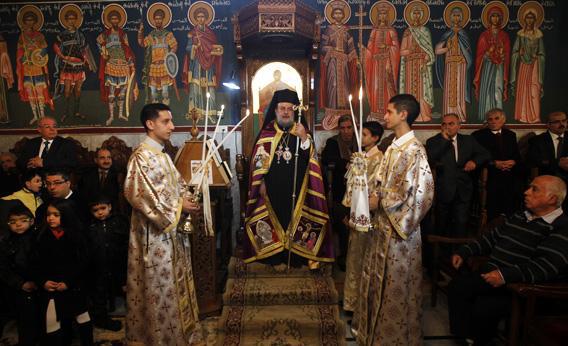Russian security forces killed three militants suspected of planning attacks on churches on Russian Orthodox Christmas in a gunfight yesterday. Russian Orthodox Christmas is today, Jan. 7. Why do Russian Orthodox Christians celebrate Christmas so much later than Western Christians?
Because the Russian Orthodox Church still observes the Julian calendar. Dec. 25 on the Julian calendar corresponds to Jan. 7 on the Gregorian calendar, which America and most of the rest of the world uses. Currently, each day of the Julian calendar occurs 13 days after its corresponding day on the Gregorian calendar—therefore, Dec. 25 on the Julian calendar corresponds to today on the Gregorian calendar. (Although the Russian Orthodox Church still uses the Julian calendar, the Russian government uses the Gregorian calendar just like the rest of the world, so for secular purposes, today is Jan. 7 in Russia, not Dec. 25.) Because the Julian calendar has a leap year in all years divisible by four—without excepting centurial years not divisible by 400, the way the Gregorian calendar does—the discrepancy between the Julian and Gregorian calendar changes periodically. For instance, beginning in 2100 the difference will increase from 13 days to 14 days when the Julian calendar adds a day to that year, and Russian Christmas will then fall on Jan. 8 instead of Jan. 7.
The Russian Orthodox Church is one of 15 mostly independent national churches that comprise the Eastern Orthodox Church. All Eastern Orthodox churches base their liturgical calendar on the Julian calendar, but some use the Revised Julian calendar. It was introduced in 1923 to bridge the gap between the Julian calendar used by the Eastern Orthodox Church and the Gregorian calendar used by the rest of the world. Currently, the Revised Julian calendar is identical to the Gregorian calendar—therefore, Orthodox Christians whose church uses the Revised Julian calendar celebrate Christmas on Dec. 25. The Greek, Cyprian, and Romanian Orthodox Churches are among the churches that use the Revised Julian calendar; the Orthodox Church in America also uses the revised calendar (with some exceptions). The Serbian, Macedonian, Georgian, and Ukrainian Orthodox Churches, like the Russian Orthodox Church, are celebrating Christmas today. Due to a difference in the way the Revised Julian calendar and the Gregorian calendar tally leap years, the Revised Julian calendar will pull ahead of the Gregorian calendar by one day in the year 2800.
Eastern Orthodox Christians often abstain from meat, eggs, dairy, and/or alcohol for a period of 40 days leading up to Christmas and then fast during the day of Christmas Eve. Christmas Eve observances include church services followed by an evening meal of 12 dishes corresponding to each of the 12 apostles. During the Soviet era, the celebration of Christmas in Russia was banned (along with the celebration of other religious holidays); during this period many Christmas traditions were transposed to New Year’s to align with the law. Since 1991 Russian Orthodox Christmas has been a public holiday in Russia.
Got a question about today’s news? Ask the Explainer.
